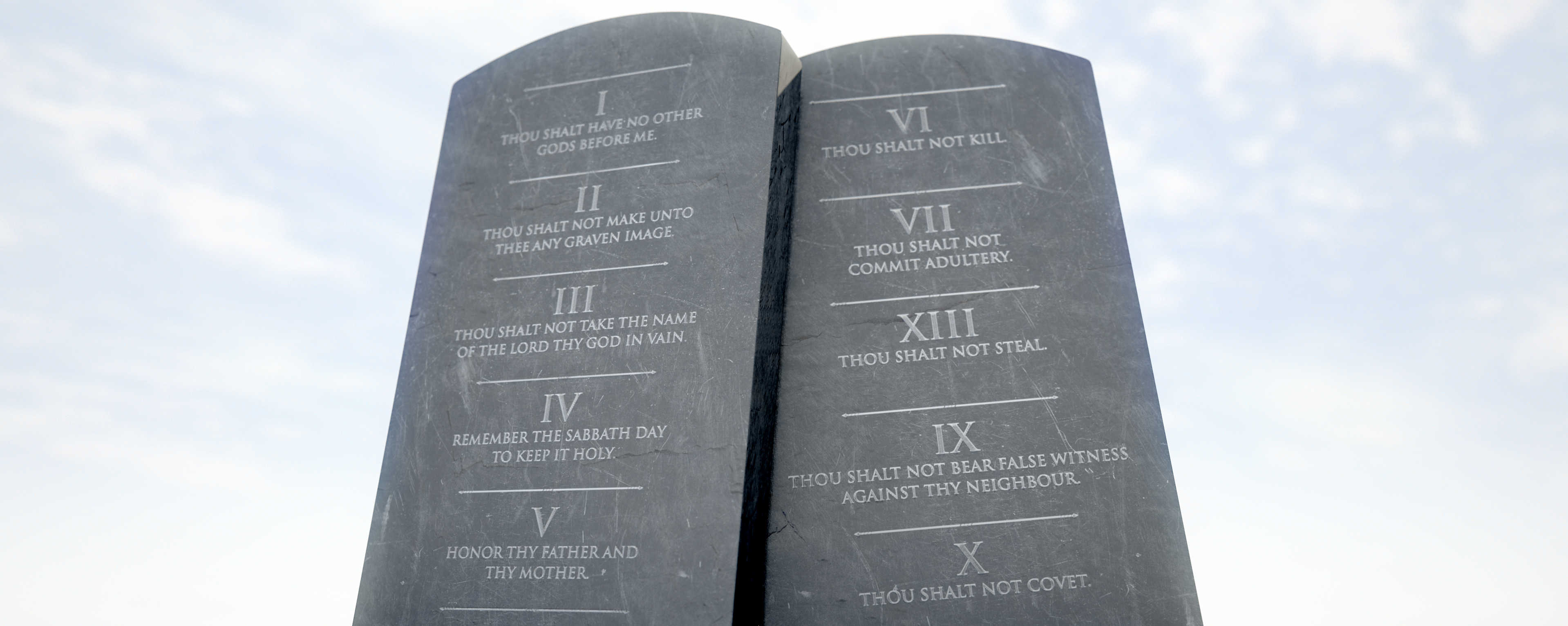What are the…
The Ten Commandments
See: Exodus 34:28; Deuteronomy 10:4, the decalogue
Origin
The Ten Commandments are a summary of the immutable moral law.
These commandments were first given in their written form to the people of Israel when they were encamped at Sinai, about 50 days after they came out of Egypt (Exodus 19:10-25).
They were written by the finger of God on two tablets (tables) of stone.
The first tablets were broken by Moses when he brought them down from the mount (Exodus 32:19), being thrown by him on the ground. At the command of God he took up into the mount two other tablets, and God wrote on them.
Now Yahweh said to Moses, “Carve out for yourself two stone tablets like the former ones, and I will write on the tablets the words that were on the former tablets which you shattered. —Exodus 34:1 LSB
These tablets were afterwards placed in the ark of the covenant (Deuteronomy 10:5; 1 Kings 8:9), also called the ark of the testimony.
However, their subsequent history is unknown.
They are as a whole called “The Covenant” (Deuteronomy 4:13), “The Tables of the covenant” (Deu. 9:9; 9:11; Hebrews 9:4), “The Testimony” and The Decalogue.
The commandments
-
Idolatry
“You shall have no other gods before Me.”
- About idolatry and false gods in the Bible
- What are the high places referred to in the Bible?
-
Idol worship
“You shall not make yourself any graven image, or any likeness of any thing that is in heaven above, or that is in the Earth beneath, or that is in the water under the earth. You shall not bow down yourself to them, nor serve them: for I the LORD your God am a jealous God, visiting the iniquity of the fathers upon the children unto the third and fourth generation of them that hate me; and showing mercy to thousands of them that love me, and keep my commandments.”
- About idols in the Bible
-
Using God’s name in vain
“You shall not take the name of the LORD your God in vain; for the LORD will not hold him guiltless that takes his name in vain.”
- What is “blasphemy”? Answer
- Names and Titles of God
-
Sabbath
Remember the sabbath day, to keep it holy. Six days shall thou labor, and do all your work: But the seventh day is the sabbath of the LORD your God: in it you shall not do any work, you, nor your son, nor your daughter, your manservant, nor your maidservant, nor your cattle, nor your stranger that is within your gates: For in six days the LORD made heaven and earth, the sea, and all that in them is, and rested the seventh day: therefore the LORD blessed the sabbath day, and hallowed it.
- What is a Sabbath?
-
Dishonoring parents
“Honor your father and your mother: that your days may be long upon the land which the LORD your God gives you.”
- See: Corban (Korban)
-
Murder
“You shall not murder.”
-
Adultery
“You shall not commit adultery.”
- Adultery and fornication in the Bible
- What are the CONSEQUENCES of sexual immorality? Answer
- Sexual lust outside of marriage—Why does God strongly warn us about it?
- Is there a way to overcome excessive lust for sex?
- Purity—Should I save sex for marriage?
- How can I deal with temptations?
-
Stealing
“You shall not steal.”
- What does Scripture say about Stealing?
- Thieves in the Bible: theft, robbery, the two thieves
-
Lying
- What is LYING? What are the truly BIG lies of our world?
- What is TRUTH? Answer
-
Covetousness
“You shall not covet your neighbor’s house, you shall not covet thy neighbor’s wife, nor his manservant, nor his maidservant, nor his ox, nor his ass, nor any thing that is thy neighbor’s.”
- What is covetousness and what does the Bible say about it?
Different divisions of the commands between the 2 tablets
The commandments are obviously “10” in number, but their division is not fixed, hence different methods of numbering them have been adopted through the years.
The Jews make the “Preface” one of the commandments, and then combine the first and second.
The Roman Catholics and Lutherans combine the first and second and divide the tenth into two. The Jews and Josephus divide them equally.
The Lutherans and Roman Catholics refer three commandments to the first table and seven to the second.
The Greek and Reformed Churches refer four to the first and six to the second table.
The Samaritans add to the second that Gerizim is the mount of worship.
More information
- The Decalogue
- law
- Details about Moses of the Bible
- The story of Moses (illustrated)
- list of the Commandments and a summary of the story of the Ten Commandments
- Why you should USE THE LAW in evangelism
- Are you a GOOD person?
- Am I Good Enough to Go to Heaven? Have you kept each of the Ten Commandments?
- What does God expect of me?
- The man who wanted to see God
- What is goodness?
- What is righteousness?
- What is godliness?
- What is HOLINESS and why are we to pursue it? Answer
- What is a tablet?
- What is a Tabernacle?
- What is the Tabernacle of Testimony?
- What is the Ark of the Covenant?
- What is a covenant?
- What is the Law of Moses?
- Coloring page
